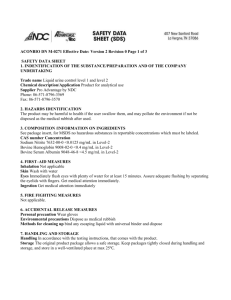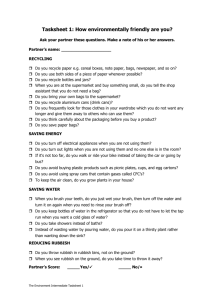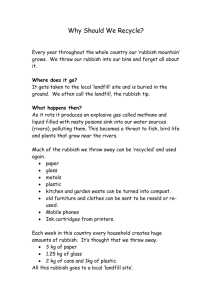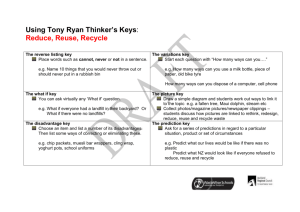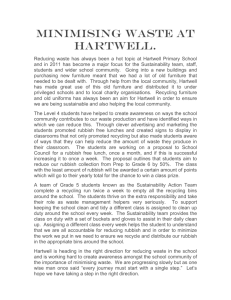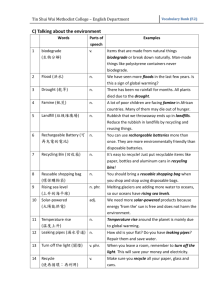Nehemiah 4:1-10 - Rev. David Jones
advertisement
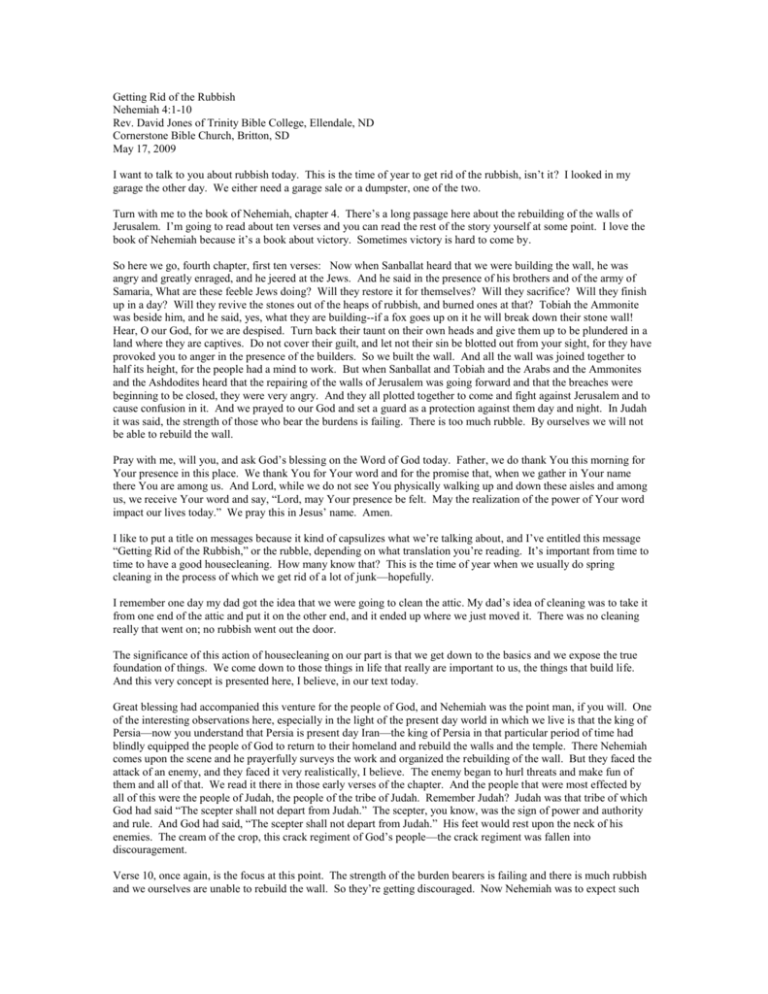
Getting Rid of the Rubbish Nehemiah 4:1-10 Rev. David Jones of Trinity Bible College, Ellendale, ND Cornerstone Bible Church, Britton, SD May 17, 2009 I want to talk to you about rubbish today. This is the time of year to get rid of the rubbish, isn’t it? I looked in my garage the other day. We either need a garage sale or a dumpster, one of the two. Turn with me to the book of Nehemiah, chapter 4. There’s a long passage here about the rebuilding of the walls of Jerusalem. I’m going to read about ten verses and you can read the rest of the story yourself at some point. I love the book of Nehemiah because it’s a book about victory. Sometimes victory is hard to come by. So here we go, fourth chapter, first ten verses: Now when Sanballat heard that we were building the wall, he was angry and greatly enraged, and he jeered at the Jews. And he said in the presence of his brothers and of the army of Samaria, What are these feeble Jews doing? Will they restore it for themselves? Will they sacrifice? Will they finish up in a day? Will they revive the stones out of the heaps of rubbish, and burned ones at that? Tobiah the Ammonite was beside him, and he said, yes, what they are building--if a fox goes up on it he will break down their stone wall! Hear, O our God, for we are despised. Turn back their taunt on their own heads and give them up to be plundered in a land where they are captives. Do not cover their guilt, and let not their sin be blotted out from your sight, for they have provoked you to anger in the presence of the builders. So we built the wall. And all the wall was joined together to half its height, for the people had a mind to work. But when Sanballat and Tobiah and the Arabs and the Ammonites and the Ashdodites heard that the repairing of the walls of Jerusalem was going forward and that the breaches were beginning to be closed, they were very angry. And they all plotted together to come and fight against Jerusalem and to cause confusion in it. And we prayed to our God and set a guard as a protection against them day and night. In Judah it was said, the strength of those who bear the burdens is failing. There is too much rubble. By ourselves we will not be able to rebuild the wall. Pray with me, will you, and ask God’s blessing on the Word of God today. Father, we do thank You this morning for Your presence in this place. We thank You for Your word and for the promise that, when we gather in Your name there You are among us. And Lord, while we do not see You physically walking up and down these aisles and among us, we receive Your word and say, “Lord, may Your presence be felt. May the realization of the power of Your word impact our lives today.” We pray this in Jesus’ name. Amen. I like to put a title on messages because it kind of capsulizes what we’re talking about, and I’ve entitled this message “Getting Rid of the Rubbish,” or the rubble, depending on what translation you’re reading. It’s important from time to time to have a good housecleaning. How many know that? This is the time of year when we usually do spring cleaning in the process of which we get rid of a lot of junk—hopefully. I remember one day my dad got the idea that we were going to clean the attic. My dad’s idea of cleaning was to take it from one end of the attic and put it on the other end, and it ended up where we just moved it. There was no cleaning really that went on; no rubbish went out the door. The significance of this action of housecleaning on our part is that we get down to the basics and we expose the true foundation of things. We come down to those things in life that really are important to us, the things that build life. And this very concept is presented here, I believe, in our text today. Great blessing had accompanied this venture for the people of God, and Nehemiah was the point man, if you will. One of the interesting observations here, especially in the light of the present day world in which we live is that the king of Persia—now you understand that Persia is present day Iran—the king of Persia in that particular period of time had blindly equipped the people of God to return to their homeland and rebuild the walls and the temple. There Nehemiah comes upon the scene and he prayerfully surveys the work and organized the rebuilding of the wall. But they faced the attack of an enemy, and they faced it very realistically, I believe. The enemy began to hurl threats and make fun of them and all of that. We read it there in those early verses of the chapter. And the people that were most effected by all of this were the people of Judah, the people of the tribe of Judah. Remember Judah? Judah was that tribe of which God had said “The scepter shall not depart from Judah.” The scepter, you know, was the sign of power and authority and rule. And God had said, “The scepter shall not depart from Judah.” His feet would rest upon the neck of his enemies. The cream of the crop, this crack regiment of God’s people—the crack regiment was fallen into discouragement. Verse 10, once again, is the focus at this point. The strength of the burden bearers is failing and there is much rubbish and we ourselves are unable to rebuild the wall. So they’re getting discouraged. Now Nehemiah was to expect such setbacks from the enemy, but this came from one of their group, a group of their own. They said in effect, “Sorry Nehemiah, sorry, there’s too much rubbish and it’s too big a job.” Judah surveyed the ruins of Jerusalem and simply concluded “we can’t do it.” But if the walls were to go up, the rubbish had to go. The foundation needed to be exposed. They must build. Now I know you’re probably asking, “What has all that got to do with my life today?” And that’s a good question. What does all this “walls” business say to us today as we read this ancient book? Well, let me simply say this: walls mean very little to the modern city, but Biblically, in those days, as we read in the Psalms and elsewhere in the scripture, that walls were a type of testimony and praise to God. They said in effect, we are the people of God and these walls are a demonstration of our view and our praise and our adoration of our God. And so, while walls mean very little to us, God’s purpose for Jerusalem was that her walls would be walls of salvation and her gates would be gates of praise. And so the truth for us to absorb here is that the emblems of testimony and praise lay in ruins. And as it applies to us today, those emblems of God’s power and purpose, our witness and testimony of God’s work in us, must be built. I’ll say it again. Those witnesses of God’s testimony and power within our lives must be built. And that which is not useful in the building of those walls is rubbish. No matter how traditional or how beautiful or how sentimental, if we cling to things that have long ago ceased to be a spiritual force in our lives, they need to go. We as human beings have a tendency to hang on to stuff. Well, maybe you don’t, but we know people. You know, we sentimentalists sentimentalize. I remember back in a church where we virtually rebuilt the church. It had been built during the war years back in the second World War and it was evident in the whole place. And so we virtually gutted the building and rebuilt it. And it was really beautiful when it was done. And the last thing was this pulpit. We had redecorated the church and it was nicely done, but the pulpit stuck out like a sore thumb. It was kind of painted redwood and everything else was kind of a bit like this. It stuck out like a sore thumb, and I made the suggestion we needed to do something about that pulpit. And, oops, I touched a sore somewhere. Because on that pulpit was a plaque to Aunt Susie who had died in 1743—well, not that long ago. What I’m saying is, we tend to sentimentalize things. I left the church long after that, not because of the pulpit, but I went back for a funeral about six months later and to my pure joy they had fixed the pulpit. Someone had gotten past the rubbish, the sentimental stuff. Because that kind of thing doesn’t lend itself to testimony and the power of God among His people. So the foundation must be exposed if we are to build a life of witness for God. And the truth is not only good for the church, it’s good for individuals as well. You know I must confess to you I’ve done a little housecleaning in these last few days myself, ‘cause you can’t preach a message like this if you haven’t done it yourself. God, help me get rid of the rubbish. Amen. And so what is the practical message of our text today. Whether in the church as a body of believers or in the individual. And the point is simply this: there is a life that must rise to the witness and praise of God. There is a life that must rise to the witness and the praise of God and in scriptures it puts it in a corporate context in I Corinthians 3 and then later on in chapter 6 it puts it in an individual context and it says, “don’t you know that your body is the temple of the Lord?” And so there’s a life that must rise to the witness and a praise of God. But the rubbish collects so easily, doesn’t it? All of the rubbish of pride and unbelief and anger and self-pity. We can list a lot of them—the rubbish of careless, dry, barren life. The strength of the laborers is failing and there’s too much rubbish, Nehemiah says. So what can you do about the rubbish, either in church or in the individual life? That’s what we want to talk about. First of all, we need to be sure that the foundation is firmly laid. Make sure the foundation is what you’re building on and not rubbish. You know, Paul puts it like this to the Corinthians. He says, “For no other foundation can be laid than that which is laid which is Jesus Christ.” The Word of God, the written Word, the Living Word. Make sure the foundation is clearly exposed. I like the name of this church—the Cornerstone Bible Church—‘cause I’m a Bible preacher. I don’t have anything to say outside of this book. So make sure the foundation is clearly exposed and Calvary is the only place for us to begin—there where Jesus alone is our glory because He is made, as scripture says, wisdom and righteousness and sanctification and redemption. He’s all we need. If we are anything, it is only by His grace and the power of His blood and the control of His Spirit. He is the Foundation. Jesus is all I need. It’s not mother or father, it’s not the church, it’s not a fellowship, it’s not anything, but Jesus is the foundation. It’s Jesus, that’s where it begins, that’s the foundation, that’s the basis. He’s the rock in the parable of the wiseman’s building. Remember the story? He’s the foundation in the building of our testimony and praise to God. Anything less is rubbish. And we must build upon the foundation. Is your life built upon the foundation of Christ? Is He your anchor, is He your rock? Is the Word of God, the written Word of God, the basis for your life? That’s where we have to begin. And secondly, in this building business, we need to remember that the work is a work of the Holy Spirit of God. Nehemiah, chapter 4, verse 10, if you go actually a little farther on down to verse 20—that’s why I said I would like to have read these all, 4, 5, and 6, but that would take too long. So you read it later. Verse 20 says Nehemiah’s conclusion to this whole thing is “for our God will fight for us.” It’s His work to build our life, it’s His work to build my life, in a witness and testimony of Him, because He began it. This Spirit of God moved upon my life one day and he dug down deep into the heart and He exposed the sin and rubbish that was there, whereupon He cast it all out—all that self-righteousness and established the foundation of Christ where there had been sifting sands and rubbish and all the rest. And that day we were saved. It was a work of the Holy Spirit of God and His alone. I still remember it, even though it’s been a long time ago now, I still remember the moment when I passed from death to life, when the Spirit of God breathed upon me and He said receive and I did and I was born again by the Spirit of God. I still remember that. What a day it was. I was saved! We call it conversion. It’s like Nicodemus, we can’t always say it as eloquently as some; but to Nicodemus, Jesus said this is how it works, Nick. He said the wind blows where it wills and you don’t know where it comes from or where it goes. So is everyone who is born of the Spirit of God. In our intellectual thinking, in our very organized mind, we like to put it in a nice little formula and say do this, this, and this and then it will happen. But you see, it’s not raising a hand. It’s not making a way to the front of the church or signing a card or anything like that. It’s the work of the Spirit. A lot of times we make decisions and there is no conversion. I was naïve when I began in ministry; I thought everybody in my church was saved. But the longer I go the more I realize that there are a lot of people in our churches that have never been born again by the Spirit of God. They are intellectually saved. They know the language but they’ve never had the Spirit of God work within their life and change them. You see, it is the work of the Spirit of God, digging deep, exposing the true condition of the heart. And in that ruins where self rules, Jesus Christ lays a foundation. He did all that for you and for me. It’s His work, you see. To use another analogy, let me take you to the book of Ephesians, for a moment. In the fifth chapter of the book of Ephesians, and we’re reminded in that context, in that setting about the bride and bridegroom—remember that, you hear it at weddings a lot of times. Notice in that setting that he’s described, that it’s the bridegroom and not the bride who is to make the bride ready or fit to meet the husband. Notice what it says, if you have your Bible, in verse 25, he says, “Christ also loved the church and gave Himself for it that He might sanctify and cleanse it, that He . . . “ My emphasis is on that word He because He is the one that does the work! Otherwise, the church is just a selfimprovement society. It is Him that does the work, you see, that He might sanctify it and cleanse it that He might present it to Himself a glorious church, not having spot or wrinkle or any such thing, but that it should be holy and without blemish. Who does that? I can’t do that—I know what I am, I know my tendencies, I can’t do that, but I know the Spirit of God can do that. So the building of the witness of the Holy Spirit within you is the work of God Himself by His Spirit. And it’s our part to allow the Holy Spirit to excavate the ruins and get rid of the rubbish. But it’s His work to let Him do it. It’s His work. Now, we’re not a non-entity in this thing. We’re not robots. It’s not a thing where we don’t count because we are to build as well. Because, if I could borrow from the Corinthian letter, we are laborers together with Him. We work with Him. In Nehemiah 4, 19 and 20, “At whatever place you hear the trumpet, rally to us there.’ You see, they’ve set up a system to defeat their foe and get rid of those that were making fun of them. They said rally to us there. We are to build with His power, in other words, and His strength; but we do the building as well. We are cooperative with the Spirit of God and in the building of the walls of Jerusalem. As for the builders, each wore his sword girded at his side as he built, shovel in one hand, sword in the other. I like that. You see, he wields the sword, we do the work. So there’s a New Testament answer as to how we build. And Peter, of all people—don’t you love Peter. When you read about Peter, there’s hope for any of us. I mean, here’s a guy that had an anger problem. Today they’d have sent him to anger management class. He had an answer for everything immediately. Most of the time without thinking. But God did a work in him. And if you want to see the other side of Peter, read his books. Second Peter—we’re talking about how we build, how we are involved in this thing. Here’s what Peter said, II Peter 1, “Make every effort [strong word in the original text] to add to your faith goodness, and to goodness knowledge, and to knowledge selfcontrol, and to self-control perseverance, and to perseverance godliness, and to godliness brotherly kindness, and to brotherly kindness love.” Now here’s the question: what kind of material are you using in building your testimony for God? Because Peter challenges us there. And in the temple of God’s Spirit with its walls of testimony and gates of praise it must be material of this sort that Peter mentions here—goodness, knowledge, self-control, perseverance. It must be material of that sort, because the scripture goes on to say in that same passage, in verse 8, “For if these things be in you and abound, you shall neither be barren nor unfruitful in the knowledge of our Lord Jesus Christ.” And just so you know I read the NIV, he says this in the NIV, “that you will keep from being ineffective and unproductive if these things be in you and abound.” What that suggests is that I have a responsibility in this building business. I can’t just hang around Jesus. I can’t just rub against others who love Jesus. I’ve got to be building as well. And if these things be in you and abound, you should not be unfruitful or unproductive in your life. The walls will go up. So whatever rubbish there may be within your life, the Holy Spirit is there to point it out. In fact, most of the time He doesn’t have to point it out; we know what it is. The blood of Christ answers for us from Heaven and cleanses us from all sin. Isn’t that great? We have simply to confess it to Him, and in so doing concur it in the authority of the Holy Spirit by the power of the blood of Jesus. And the walls will go up. And when we do that, He will add His mortar to our building blocks of faith. Judah complained the strength of the laborers is failing. There is so much rubbish that we cannot build the wall. And I guess what I’m saying this morning is if that is your condition today, the indwelling faithful Christ is ready to fill the garbage truck, the garbage truck of His mercy and grace, with all the rubbish that you’re willing to get rid of. And we must get rid of the rubbish, church. We must get rid of the rubbish, people, so that by His grace the walls of faith and testimony and praise will be built as an everlasting witness to a true and living God. If you go on a couple of chapters in Nehemiah, because I always like to read what’s coming ahead. I’m never good at reading books without reading the end first. If you go to the sixth chapter, verse 15, this is what it says: “So the wall was finished.” Hallelujah. So the wall was finished, and my friends this morning He that has begun a good work in you will bring it to perfection until the day of Jesus Christ. But you’ve got to get rid of the rubbish. Build the walls of testimony and faith. That’s the call in this passage. Build the wall of testimony and faith in your life. That’s the call. And that’s my appeal to you from this passage in scripture. Will you bow your heads with me in prayer. Our Father, we’re thankful for the patience and the grace of Your Holy Spirit. We thank You, Lord, that You are a God of mercy; and when You invest Yourself within our lives as individuals, You are by all purposes, by all eternal purpose, are married to us. And I pray this morning that Your Word would speak to our hearts, each of us here. And as we look at our hearts this morning, if there is any rubbish that hinders the building of the wall of witness and praise to You, in the world in which we live and the world that we touch, we pray that by Your grace You will touch our lives today and by Your Holy Spirit begin to mine our hearts again so that we can get rid of the rubbish and build to Your glory and honor. We pray this in Jesus name. Amen. God bless you. ###
